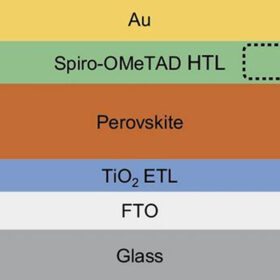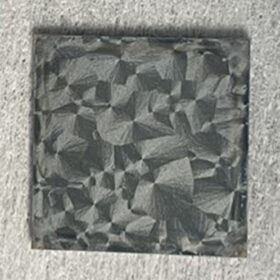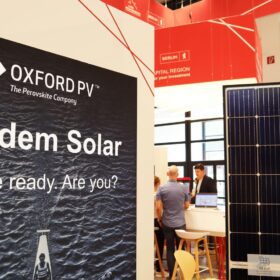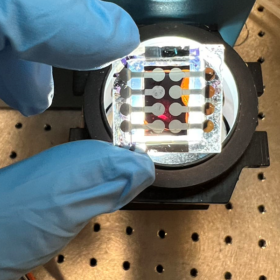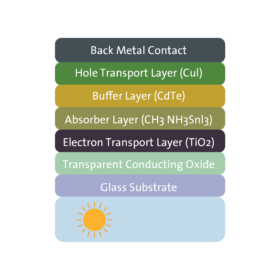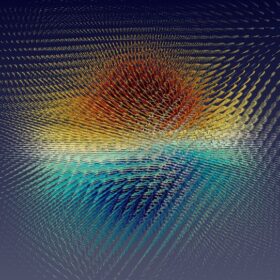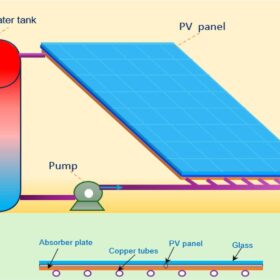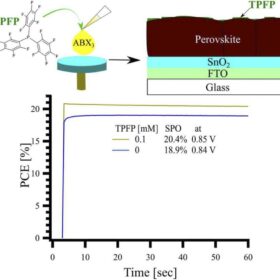EU-funded project seeks set up pilot production of large-area perovskite PV modules
The EU-funded Laperitivo project aims for 22% efficiency in 900 cm² opaque perovskite modules and 20% efficiency in semi-transparent ones. The project partners include imec, Fraunhofer ISE, TotalEnergies, and EDF.
Perovskite solar cell based on lithium salt-doped spiro-OMeTAD achieves 25.45% efficiency
Researchers in China have proposed a new lithium-free doping strategy to fabricate spiro-OMeTAD-based hole transport layers (HTLs) for applications in perovskite solar cell. A PV device built with a salt-doped HTL achieved a record-breaking efficiency of 25.45%.
Terpyridine-passivated perovskite solar cells achieve 25.24% efficiency
An international team of researchers demonstrated perovskite solar cells treated with a molecular passivator based on π-conjugated terpyridine Lewis-base molecules that achieved 25.24% power conversion efficiency, with 90% retained after 2,664 hours of light exposure. The treatment reportedly works at high concentrations without damaging the perovskite film or diminishing cell performance. A protocol was published to reproduce the results, opening the door to testing it on a range of perovskite absorbers.
Photon shifting, trapping enable 28.2% higher photocurrent in perovskite solar cells
Researchers in Portugal adopted a new light trapping strategy to build an ultrathin perovskite solar cells that may reportedly have a longer operational lifetime. They utilized an LDS coating combined with a checkerboard photonic front structure to protect the cells against UV-enabled degradation and simultaneously improve UV irradiation.
Oxford PV starts commercial distribution of perovskite solar modules
Oxford PV is delivering its first commercial perovskite solar modules to US customers. The 72-cell solar modules have an efficiency of 24.5% and, according to the company, can generate up to 20% more energy than conventional silicon modules.
All-perovskite tandem solar cell based on tin-lead perovskite achieves 28.8% efficiency
An international research team has developed an all-perovskite tandem PV device that reportedly shows reduced recombination losses in the cell’s bottom device and remarkable stability. To improve the perovskite solar cell’s surface, the scientists created partially non-conductive and non-functional areas that protect the perovskite area underneath from becoming defective.
Improving perovskite solar cell performance with cadmium telluride buffer layer
An international research team has conducted a series of simulations to investigate how a cadmium telluride buffer layer may help increase efficiency and stability in perovskite solar cells. Their experiment showed that cell efficiency may climb from 11.09% to 23.56%.
New discovery paves the way for more efficient perovskite solar cells
Researchers from University of Texas have used computational methods to study the formation of polarons in halide perovskites. The findings revealed topological vortices in polaron quasiparticles.
Hydronic closed-loop cooling system for photovoltaic modules
An international research team has developed a closed-loop PV cooling system that can reportedly offer 24-hour continuous operation. The system is claimed to be particularly suitable for hot and arid regions and to improve the lifespan of solar panels by up to 8.2%.
Thin-film perovksite solar cell based on fluorinated phosphoric acid achieves 20.5% efficiency
Japanese scientists built a thin-film perovskite solar cell incorporating fluorinated phosphoric acid (TPFP) into the absorber’s precursor solution. The device achieved remarkable power conversion efficiency due to effective passivation at the interface between the perovskite film and the hole transport layer.

